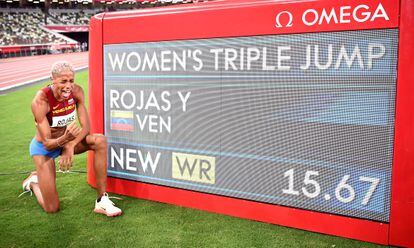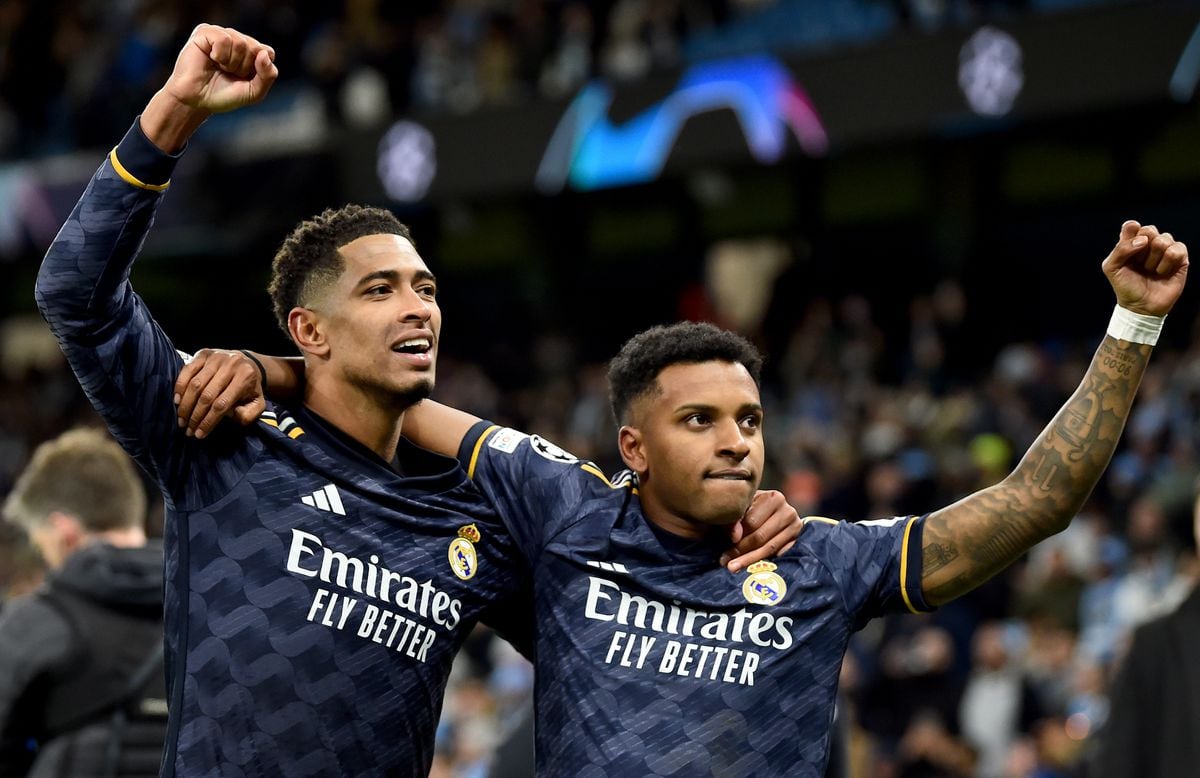Verstappen, right, celebrates his title in Abu Dhabi against Hamilton.AHMED JADALLAH (Reuters)
Bathed in the light of the fading twilight, from the rainbow cresting that Pablo Neruda sang of the baroque, the dinosaurs of sport contemplate their kingdom, which they believe to be endless, they are both capable of lengthening their careers, and they rejoice. There are all the champions who are respected and admired for their longevity, for their still mental freshness, for their desire to remain the best, for refusing to surrender to the time that devours them, for their submission to the technical scientific approach of the preparation that improves everything, because of his work ethic.
There are the three best tennis players in history, 60 greats among the three, 20 each, and they continue to add, Nadal, Federer and Djokovic. Tennis is, under his reign, an old man's sport. Nole, 34 years old, is, at the end of the year, the oldest number one in history; Federer just turned 40; Nadal, 35. They limp and limp and keep marking territory. Like Serena Williams, the tennis player of the 23 greats, 40 years old, like Federer. 31 tennis players in the top 100 of the ATP are over 30 years old, more than ever, four Spaniards among them: along with Nadal, Andújar (35), Bautista (33) and Ramos (33). Behind the three very great, 60 greats, which is equivalent to 15 years in a row with no other winner of Wimbledon, Australia, Roland Garros or US Open than one of them, several generations of tennis players deprived of dreams and great rewards.
Ibrahimovic, 40, continues to score for Milan (and last November he became the first player over 38 to score at least 10 goals in one of the five major leagues). At almost 37 years old and at United, Cristiano Ronaldo still reaches
young
sprinter
speeds
in his starts: more than 32 kilometers per hour they measured him in a game in September, just weeks before playing his 184th game for Portugal and breaking the record European with the highest number of caps (and 115 goals for the coleto). Leo Messi is already 34 years old, and continues to win Ballons d'Or, denying them to the youngest. At 39, Granada forward Jorge Molina has made the oldest treble in the league. No one older in the big five leagues has been able to pull it off.
Tom Brady,
quarterback
of the Buccaneers, has achieved at age 44, just ago, the record for yards in the NFL.
At the Tokyo Games, the same day that Simone Biles returned to the track, the young woman who symbolizes that for the new generation stress, abuse by coaches, the reduction of life to two poles, failure / success, have been Turned into insurmountable obstacles, Oksana Chusovitina, 46, says goodbye to gymnastics, a Soviet (at 17, gold in Barcelona 92 by teams) for whom there was never, not even for her contemporaries, the so-called problem of mental health.
Spain participated in the Games with Chuso García Bragado, who finished the 50-kilometer event at age 51, in his eighth Olympic event. No athlete older than him. And also in Tokyo was Alejandro Valverde (41 years old), who is still the best Spanish cyclist, the oldest world champion (38 years old), 20 times in the top 10 between Giro, Tour and Vuelta. And he continues to pedal, and plans to win Liege, his fifth Liege, on the day he turns 42. Pau Gasol, at age 40, won an ACB League with Barça, played in the Euroleague final and with the national team finished sixth in Tokyo, and then retired. In Tokyo, Sandra Sánchez (40), Teresa Portela (39), Maialen Chourraut (38), Saúl Craviotto and Damián Quintero (37) won medals.
And in the valley, in his sight, the young men pick grass.
They prepare their revolt.
The old have closed their fort, they have wanted to prepare the young-young to fail, to burn them down.
They have wanted them resigned, but they have made them a kind of revolutionaries, before whom they are scared.
And to those who ask for respect for the rules, for the traditions, to those who predict that they will be exhausted very young, so much drive, so much desire and anger, so many burned-out stages, they answer that all the old people who gave them also started very young. now advise calm.
Challenge, risk and audacity
Lewis Hamilton (36) is seeking his eighth F1 world title, the championship that would allow him to break the tie at the top with Michael Schumacher.
His rival is Max Verstappen, an irreverent young man, baptized in motor oil, the son of a pilot, raised to live fast and win even faster, like all young men of great talent.
At the age of 18, in 2016, he won at Montmeló: never had such a young rider prevailed in a Grand Prix.
Five years later, at 24 and two months, he defeated Hamilton on the last lap of the last Grand Prix, and won the World Cup.
Venezuelan Yulimar Rojas, after breaking the world record for triple jump at the Tokyo Games.CHRISTIAN BRUNA (EPA-EFE)
He seems very young, but he is not even as young as the British when he won his first World Cup, 23 years and 300 days in 2008, not even as young as Sebastian Vettel when his first coronation (23 years and 134 days) or like Fernando Alonso. in 2005 (24 years and 58 days). And Alonso, at 40, is still a pilot and ambitious.
He is not as young as they are, but he is different. His generation, Gen Z, is something else. Verstappen and other champions born in the second half of the 90s and around the 2000s, born digital, born already known, more than age unites them with a certain disregard for traditions and the so-called unwritten laws of their sports, in those who proclaim themselves unique. They only respond to the wishes of a hobby that, like them, seeks that victory is not the only thing that counts, but the way in which it is achieved, defiantly, against the logic established by routines, with risk and audacity. Without measure.
The same year that Verstappen broke the mold of F1, a blow that he already announced in his first year on the circuit - "I'm here to be the best" -, Jon Rahm (born three years earlier, in November 1994) has won his first major, the US Golf Open, and has finished world number one in the sport that is most bothered by earthquakes. Five years ago, a boy still 22, Rahm was already knocking loudly on the door of professional golf, each stroke, a declaration of principles as resounding as can only be that of the young people of his time, who are joined by the same contempt for golf. risk. They are never afraid of losing, they are only afraid of not winning. "I want to take golf to another level," he announced in December 2016. In his first four years in the PGA, he has already finished in the top six in a world that is looking for a pattern after the
Tiger Woods era.
.
After the fifth year, it is already first.
Beyond their generational coincidence, the evolution of the two, of Verstappen and Rahm.
It is very similar: without giving up their essence, their taste for risk, their sporting irreverence before the holy men of their sport, the two have known how to find a way to play with the limits, to mold them, to find good
timing.
When making decisions, not always risk to risk, even if it seems so.
The same generational signals also respond to the third great champion of the 21, the cyclist Tadej Pogacar, the number one in the world, who, at the age of 23, has already won the Tour twice and two monuments, and runs in such a way , and exhibits such narcissism disguised as naivety, that Eddy Merckx, the Cannibal, the arrogant absolutist who for 50 years had refused to recognize in any cyclist any virtue that would allow him to say, this is me, has had to give up.
"Pogacar is the new Cannibal," said Merckx. It is not as simple a proclamation as it sounds. The god Merckx could have chosen Remco Evenepoel, Belgian and child (year 2000), who has turned each of his careers into a challenge to the purists of calculation and the metronome; or to another Belgian, Wout van Aert, or to the Dutch Matthieu van der Poel, the oldest of the Z. Pogacar, reached the top from remote (cyclistically) Slovenia, is the tip of the iceberg of a new cycling culture, of tremendously individualistic champions, owners of technology and a unique preparation, and a mentality that disdains routine.
Restless
Like Verstappen, like Rahm.
Like the Norwegian athlete Jakob Ingebrigtsen, Olympic champion of 1,500m at the age of 20 (born in September 2000) and, the fruit of a family training (his father is his coach) and independent, specialist also in distance and cross.
The athlete who does his own thing and is not accountable to anyone leads another band of young people his age who in the empty Tokyo Olympic stadium left half the world salivating this August.
Yulimar, Cerezo, Gavi ...
Assuming talent and ability, audacity sets them apart from champions of other times: another Norwegian, Karsten Warholm (February 1996) ran five 400m hurdles races in the year, breaking a record in two of them of the world that dated from 92 and was believed unapproachable;
the Swedish Mondo Duplantis (November 99), already world pole vault record holder at age 20, was proclaimed Olympic champion at 21, and Yulimar Rojas (October 95), Olympic champion and world record holder in triple jump, also dazzled;
Athing Mu (June 2002), gold in 800m, and it is known that she will be able to break the world records of 400m and 800m, Sydney McLaughlin (August 99), Olympic champion and world record holder of 400m hurdles ...
Carlos Alcaraz, TIZIANA FABI (AFP)
Not just Rahm, a Basque matured in his own way in Arizona. The new style, the new sports culture of the Z generation (those born from the mid-90s), competitors without cobwebs in their heads, without hangovers or fears, also bears more fruit in Spain.
From Murcia, where Valverde, the old man, comes from Carlos Alcaraz, the young (May 2003) prodigy of precocity who has finished the 32nd year in the world and sharpens his racket to attack the sacred cows of his sport. At the Games, Alberto Ginés, an Extremaduran from October 2002, was proclaimed Olympic champion in the brand new climbing specialty, and Adriana Cerezo from Complute (November 2003) was silver in taekwondo. And the winner of the Giro sub-23, Juan Ayuso (September 2002) will already begin in a month in the WorldTour to show that the end of the desert crossing of Spanish cycling is near.
They are prodigies that have exploded in usually silent sports, but the Z explosion has also been repeated in the loudest, in football, with the irruption in the Spanish team, from the fearless hand of Luis Enrique of a team of talents that could be called
the generation of diminutives:
Dani (Olmo), Pedri, Gavi ... In 2021, Dani (May 98) and Pedri (November 2002) have been the visible head of a team that played the semi-finals of the Euro (and he only lost to the old champion Italy on penalties) and the Olympic final.
Gavi (August 2004) joined to play the final of the League of Nations, which they lost by the minimum against Mbappé's France, precisely the footballer Z (December 98) who has the best chance of breaking the insolent dominance of the Christian couple -Messi in the last two decades.
You can follow EL PAÍS DEPORTES on
and
, or sign up here to receive
our weekly newsletter
.







/cloudfront-eu-central-1.images.arcpublishing.com/prisa/S7UVDTX7DREC7DXVCZN6MEKGBY.jpg)

